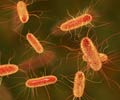Taking a major step in metabolic engineering, scientists have now used the bacterium Escherichia coli to synthesize a class of natural products, called bacterial aromatic polyketides.
Taking a major step in metabolic engineering, scientists have now used the bacterium Escherichia coli to synthesize a class of natural products, called bacterial aromatic polyketides, which include important antibiotic and anticancer drugs.
Natural products are pharmacologically or biologically potent chemical compounds produced by living organisms, and many are the active ingredients in pharmaceuticals.Bacterial aromatic polyketides include the antibiotic tetracycline and the compound doxorubicin, which are used in the treatment of breast and other cancers.
As many of these natural products are synthesized by organisms that are difficult to collect, grow and maintain, researchers from the UCLA Henry Samueli School of Engineering and Applied Science have sought to produce them using simpler organisms like E. coli.
The researchers chose E.Coli because its fast growth, variety of genetic tools and well-understood metabolism make it an ideal host for engineering and mass-producing these compounds.
Turning E. coli into a microbial factory for natural products has been highly successful as it led to the production of groups of drugs that include antibiotics like erythromycin and vancomycin, as well as terpenes and alkaloids.
However, attempts to synthesize bacterial aromatic polyketides had previously been hindered by the compounds' complicated assembly process.
Advertisement
The synthetic enzyme, thus produced, is necessary to synthesize the carbon backbone of aromatic polyketides, which was previously inaccessible in E. coli.
Advertisement
"This is a key advance in the field of natural product biosynthesis. We have now outfitted E. coli with the ability to make this family of compounds that are vital toward treating diseases such as infectious diseases and cancer," said Tang.
He added: "Furthermore, we can now take advantage of the E. coli machinery to engineer the pathways we introduced and synthesize new versions of natural products that may be more potent than the current versions - so-called unnatural natural products."
The study will be published in an upcoming issue of Proceedings of the National Academy of Sciences and is currently available on the journal's website.
Source-ANI
SRM












